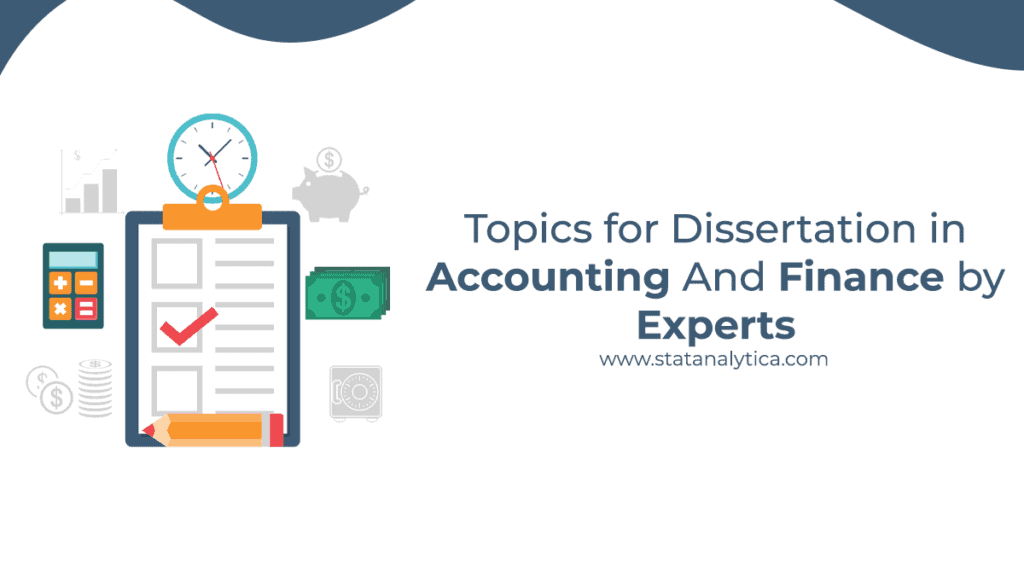Accounting is a highly versatile field with numerous applications in the business world. It is also a constantly evolving field, making it a great area for research.
Accounting research helps us better understand how financial systems work and how we can improve them.
It also enables us to make informed decisions in business and our personal lives.
Accounting is a broad subject with numerous research topics and ideas. Selecting the right one can be a difficult task.
This blog will discuss some of the top-rated accounting research topics. To save you from the struggle, we’ve compiled a list of the top accounting research paper topics. These topics are sure to impress your professor.
Top 15+ Accounting Research Topics For Students In 2023
Table of Contents
Here are the top 15+ accounting research topics for students in 2023:
1. Financial Reporting
Financial reporting is an essential aspect of accounting.
It involves preparing and presenting financial statements that provide useful information to investors, creditors, and other stakeholders.
Financial reporting research focuses on improving the accuracy and reliability of financial statements.
It also examines the impact of financial reporting on the decision-making process of stakeholders.
2. Accounting Ethics
Accounting ethics is an important topic in accounting research.
It examines the ethical issues that arise in accounting practices, such as conflicts of interest, fraud, and ethical decision-making.
Accounting ethics research aims to guide ethical behavior and improve the ethical standards of the accounting profession.
3. Corporate Governance
Corporate governance refers to the processes and structures that govern the behavior of corporations.
Corporate governance research examines the effectiveness of corporate governance mechanisms in promoting transparency, accountability, and ethical behavior.
It also explores ways to improve corporate governance to prevent fraud and other unethical practices.
4. Financial Analysis
Financial analysis is a crucial aspect of accounting research.
It involves analyzing financial data to assess the financial health of companies.
Financial analysis research explores how to improve financial analysis methods, including data analytics and artificial intelligence.
It also examines the impact of financial analysis on decision-making processes.
5. Sustainability Accounting
Sustainability accounting is a relatively new area of accounting research.
It involves accounting for business operations’ social, environmental, and economic impacts.
Sustainability accounting research explores ways to integrate sustainability into accounting practices to improve decision-making and promote sustainable business practices.
6. Cost Accounting
Cost accounting is an essential accounting aspect involving analyzing and managing costs in business operations.
Cost accounting research explores ways to improve cost accounting techniques to enhance decision-making. It also examines the impact of cost accounting on business performance.
7. International Accounting
International accounting involves the application of accounting principles in a global context.
International accounting research explores ways to improve accounting practices to meet the needs of global stakeholders.
It also examines the impact of globalization on accounting practices and the global economy.
8. Financial Statement Analysis
Financial statement analysis is a process that helps a company understand its finances. It involves reviewing a company’s financial statements, including the balance sheet, income statement, cash flow, and notes to accounts.
Creditors, investors, regulatory authorities, and executive management rely on financial statements to make intelligent business decisions. They need to know whether a company is financially sound and can pay back debts when they are due.
Financial statement analysis uses several techniques to help stakeholders make informed decisions about the future of a business. It also considers risks and uncertainties that can affect the information in a company’s financial statements.
9. Financial Planning
Financial Planning is the process of assessing your current financial situation and taking that information to manage your money in a way that allows you to achieve your goals. This can include everything from retirement to estate planning and tax planning.
The key to a successful financial plan is to monitor your progress, compare forecasts with actual results, and make necessary adjustments. This helps you to spot any issues before they become a problem and find smarter growth opportunities.
The traditional approach to business planning has evolved from a largely manual, periodic activity to a more data-driven and connected, increasingly predictive process. It incorporates advanced technologies like machine learning to predict outcomes based on multiple data points, scenarios, and trends.
Read More
- What is retail marketing? And it’s Type
- Do Not Miss To Check Top 15 Best Accounting Books For Beginners
10. Auditing
Auditing is examining financial statements to ensure that they are accurate and reliable.
Auditing research explores how to improve the audit process, including technology and data analytics. It also examines the impact of auditing on financial reporting and the decision-making process of stakeholders.
It ensures that they comply with the appropriate accounting standards. It also helps identify areas that may have been mishandled or fraudulent.
During an audit, auditors examine a company’s records, including financial reports and other documents, for accuracy, efficiency, and compliance with generally accepted accounting principles (GAAP). They also look for potential fraud risks or other issues that could affect the organization.
The evidence that auditors use during an audit can come from a number of sources, such as legal documents, presentations, or oral interviews with employees. The nature and relevance of this evidence are important factors in determining the effectiveness of an audit.
11. Accounting Theory
Accounting theory is a set of principles that guides accountants in generating, recording, and classifying information. They are also responsible for interpreting and communicating the financial data to readers appropriately.
Sociological and economic environments influence accounting theories. Moreover, they are also influenced by social and political views.
The research explores accounting theory’s origin, growth, and development and its fundamental theoretical concepts. It also discusses theories of Income Determination and diversities in using Accounting Information.
12. Management Accounting
Management accounting is a type of accounting that uses data to help managers make decisions. Unlike financial accounting, management accountants rely on historical trends and future forecasting to determine a business’s best course of action.
Management accounting involves using accounting information to make informed decisions in business operations. Management accounting research explores ways to improve management accounting techniques to enhance decision-making. It also examines the impact of management accounting on business performance.
Management accountants gather and analyze information to help internal managers formulate policies, budgets, and other financial and non-financial information needed to make informed decisions. They also help plan operations, prepare financial forecasts, and analyze business risks and opportunities.
The key difference between managerial and financial accounting is that management accountants provide information based on the needs of the company’s management rather than merely representing it according to GAAP (Generally Accepted Accounting Principles). Management accounting produces data intended for internal stakeholders within a company, including shareholders, owners, employees, lenders, and government agencies.
13. Taxation
Taxation is a critical aspect of accounting that affects individuals and businesses alike. Taxation research examines how tax policies impact economic growth and development. It also explores ways to improve tax systems to make them more efficient and effective.
Also, Taxation has been an essential part of human civilization since ancient times. A government taxes its citizens and corporations to raise funds for the services they provide or for the public good.
There are different types of taxes, including corporate and personal income taxes, sales and property taxes, and tariffs. There are also different regulations for each type of tax.
Accountants use tax data to calculate taxable income and determine company tax liabilities. They then convey this information to managers, shareholders, creditors, and regulators.
14. Accounting Information Systems
Accounting information systems are software tools that allow businesses to record, classify, interpret, and present accounting data. They can also be used to monitor a business’s operations and make recommendations for improvement.
An AIS can be as simple as paper and pen, or it can be highly sophisticated with advanced technology. The system’s main goal is to meet the organization’s and its people’s needs.
A major concern with accounting systems is security. They need to be built to protect customer, vendor, and other company information. This can be done through policies and procedures that limit access to specific information by users and through physical access approvals, login requirements, and authorizations.
Another important component of an AIS is storage. This is where the ledgers and reports are stored after the system has processed them. This is usually done through hard disks, flash drives, memory cards, or cloud infrastructure.
15. Inventory Management
Inventory management is a critical aspect of any business that deals with physical goods.
It involves monitoring, controlling, and optimizing inventory levels to ensure that products are available when customers need them while minimizing the costs associated with carrying inventory.
Effective inventory management can help businesses improve their cash flow, reduce waste, and increase customer satisfaction.
There are several key components of inventory management, including forecasting, ordering, receiving, storing, tracking, and analyzing inventory levels.
16. Quality Control
Quality control in accounting refers to the measures taken by accounting firms and professionals to ensure that their work meets the required quality standards.
It is a systematic approach to maintaining high standards of accounting and auditing practices, and it helps to ensure that the financial information reported by an organization is complete and free from material misstatements.
Quality control is essential for maintaining the integrity and credibility of accounting information used by businesses, investors, and other stakeholders to make important decisions.
Conclusion
In conclusion, accounting research is an essential aspect of the accounting profession.
It helps us better understand financial systems and improve decision-making processes.
The topics discussed above are just a few of the many areas of accounting research.
As students, you can contribute to the field by researching and advancing our understanding of accounting.
There are many accounting research topics for students to consider. The most important factor when choosing a topic is the interest and skills of the student.

